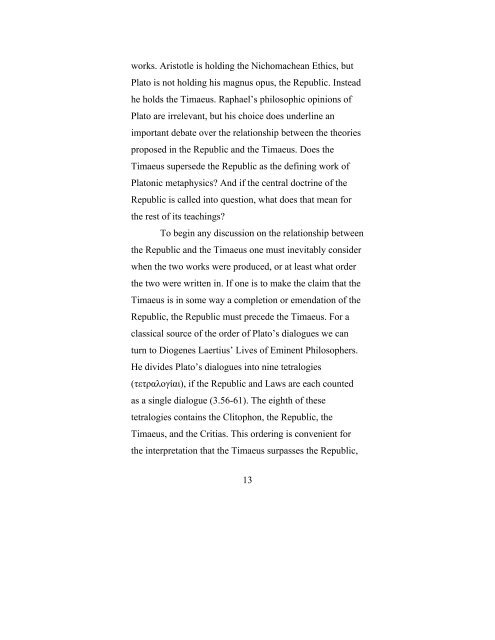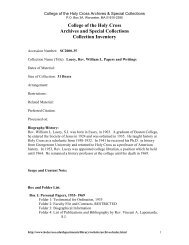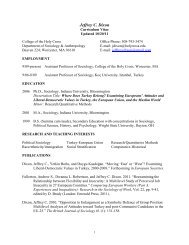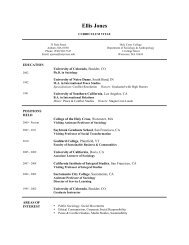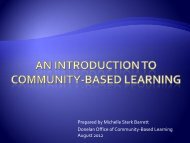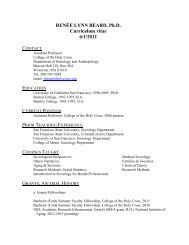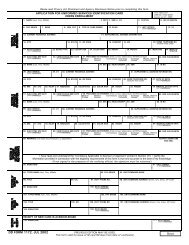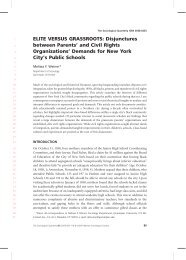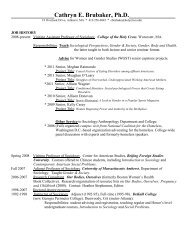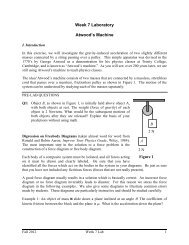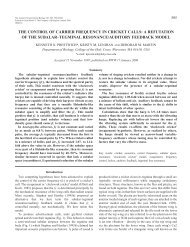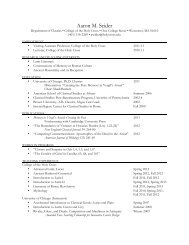Here - Academics - College of the Holy Cross
Here - Academics - College of the Holy Cross
Here - Academics - College of the Holy Cross
You also want an ePaper? Increase the reach of your titles
YUMPU automatically turns print PDFs into web optimized ePapers that Google loves.
works. Aristotle is holding <strong>the</strong> Nichomachean Ethics, but<br />
Plato is not holding his magnus opus, <strong>the</strong> Republic. Instead<br />
he holds <strong>the</strong> Timaeus. Raphael’s philosophic opinions <strong>of</strong><br />
Plato are irrelevant, but his choice does underline an<br />
important debate over <strong>the</strong> relationship between <strong>the</strong> <strong>the</strong>ories<br />
proposed in <strong>the</strong> Republic and <strong>the</strong> Timaeus. Does <strong>the</strong><br />
Timaeus supersede <strong>the</strong> Republic as <strong>the</strong> defining work <strong>of</strong><br />
Platonic metaphysics? And if <strong>the</strong> central doctrine <strong>of</strong> <strong>the</strong><br />
Republic is called into question, what does that mean for<br />
<strong>the</strong> rest <strong>of</strong> its teachings?<br />
To begin any discussion on <strong>the</strong> relationship between<br />
<strong>the</strong> Republic and <strong>the</strong> Timaeus one must inevitably consider<br />
when <strong>the</strong> two works were produced, or at least what order<br />
<strong>the</strong> two were written in. If one is to make <strong>the</strong> claim that <strong>the</strong><br />
Timaeus is in some way a completion or emendation <strong>of</strong> <strong>the</strong><br />
Republic, <strong>the</strong> Republic must precede <strong>the</strong> Timaeus. For a<br />
classical source <strong>of</strong> <strong>the</strong> order <strong>of</strong> Plato’s dialogues we can<br />
turn to Diogenes Laertius’ Lives <strong>of</strong> Eminent Philosophers.<br />
He divides Plato’s dialogues into nine tetralogies<br />
(τετραλογίαι), if <strong>the</strong> Republic and Laws are each counted<br />
as a single dialogue (3.56-61). The eighth <strong>of</strong> <strong>the</strong>se<br />
tetralogies contains <strong>the</strong> Clitophon, <strong>the</strong> Republic, <strong>the</strong><br />
Timaeus, and <strong>the</strong> Critias. This ordering is convenient for<br />
<strong>the</strong> interpretation that <strong>the</strong> Timaeus surpasses <strong>the</strong> Republic,<br />
13


